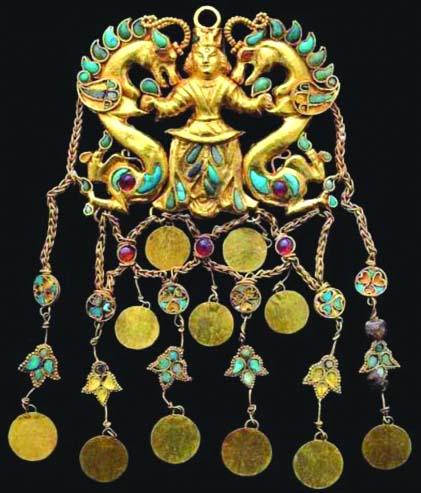
Xinhua, Kabul :
Small Afghan women entrepreneurs and workers have called on the government to help them in marketing their products inside the country and abroad.
“We have products but not market. That is why we are asking the government to help find markets for our products,” Sitrara Karimi, an ornament maker, told Xinhua recently.
Karimi, in her mid-thirties, is among the 25 women workers of Mashal-e-Geti (Torch of World) Association, a local company that makes ornaments and jewelry.
According to Karimi, with government support, the company where she works can employ more women. “The government can help promote our products locally and abroad,” she said.
Karimi said that Afghan women have the talent to produce world- class ornaments and jewelry made from gold, silver and titanium.
She said Afghan women, if given the right incentives, can help revive the ailing Afghan economy.
“We want to expand our business. So we want the government to help us market our products abroad and if we expand, we can hire more Afghan women,” Mrs.Hanifa Akrami, managing director of Mashal- e-Geti company, said.
Based in the relatively peaceful Herat City in the western Herat province, the Mashal-e-Geti company, established one year ago, is run by an all-woman staff. Women in Herat City have been encouraged to break from their traditional role and take part alongside their male partners in making their war-ravaged country stand on its feet.
“Afghan women are capable of doing functions similar to those being done by women in developed countries. Certainly they can contribute to the development and prosperity of Afghanistan,” Karimi said.
In the post-Taliban and conservative Afghanistan where traditions are deep-rooted and cultural values are respected, women, especially in the countryside, are hardly allowed to work outside their homes.
Nonetheless, the situation has been changed in big cities such as the capital city Kabul, western Herat, northern Mazar, southern Kandahar and the eastern Jalalabad cities where many women can now work and girls can now to schools.
In fact, with the collapse of the six-year brutal rule of the Taliban in 2001, Afghanistan has now women Cabinet ministers, parliamentarians, businesswomen, artists, actresses, singers and musicians, which was unthinkable during the Taliban regime.
During the Taliban rule, girls were banned from going to schools and women were confined to their homes.
“In my opinion, women should not be dependent on men in society and in the work place. Women should be allowed to work and earn money to support their families,” another employee of the company, Razma Sediqi, said.
Sediqi said she is satisfied with what she earns from the company. “With my salary, I can support my eight-member family,” she said.
According to her, she and other women who work at home for the company can earn up to 300 U.S. dollars a month.
Aside from making ornaments and jewelry, other small businesses run by women are engaging in music production, embroidery, carpet weaving, and selling home-made products including foodstuff and delicacies.
Small Afghan women entrepreneurs and workers have called on the government to help them in marketing their products inside the country and abroad.
“We have products but not market. That is why we are asking the government to help find markets for our products,” Sitrara Karimi, an ornament maker, told Xinhua recently.
Karimi, in her mid-thirties, is among the 25 women workers of Mashal-e-Geti (Torch of World) Association, a local company that makes ornaments and jewelry.
According to Karimi, with government support, the company where she works can employ more women. “The government can help promote our products locally and abroad,” she said.
Karimi said that Afghan women have the talent to produce world- class ornaments and jewelry made from gold, silver and titanium.
She said Afghan women, if given the right incentives, can help revive the ailing Afghan economy.
“We want to expand our business. So we want the government to help us market our products abroad and if we expand, we can hire more Afghan women,” Mrs.Hanifa Akrami, managing director of Mashal- e-Geti company, said.
Based in the relatively peaceful Herat City in the western Herat province, the Mashal-e-Geti company, established one year ago, is run by an all-woman staff. Women in Herat City have been encouraged to break from their traditional role and take part alongside their male partners in making their war-ravaged country stand on its feet.
“Afghan women are capable of doing functions similar to those being done by women in developed countries. Certainly they can contribute to the development and prosperity of Afghanistan,” Karimi said.
In the post-Taliban and conservative Afghanistan where traditions are deep-rooted and cultural values are respected, women, especially in the countryside, are hardly allowed to work outside their homes.
Nonetheless, the situation has been changed in big cities such as the capital city Kabul, western Herat, northern Mazar, southern Kandahar and the eastern Jalalabad cities where many women can now work and girls can now to schools.
In fact, with the collapse of the six-year brutal rule of the Taliban in 2001, Afghanistan has now women Cabinet ministers, parliamentarians, businesswomen, artists, actresses, singers and musicians, which was unthinkable during the Taliban regime.
During the Taliban rule, girls were banned from going to schools and women were confined to their homes.
“In my opinion, women should not be dependent on men in society and in the work place. Women should be allowed to work and earn money to support their families,” another employee of the company, Razma Sediqi, said.
Sediqi said she is satisfied with what she earns from the company. “With my salary, I can support my eight-member family,” she said.
According to her, she and other women who work at home for the company can earn up to 300 U.S. dollars a month.
Aside from making ornaments and jewelry, other small businesses run by women are engaging in music production, embroidery, carpet weaving, and selling home-made products including foodstuff and delicacies.

